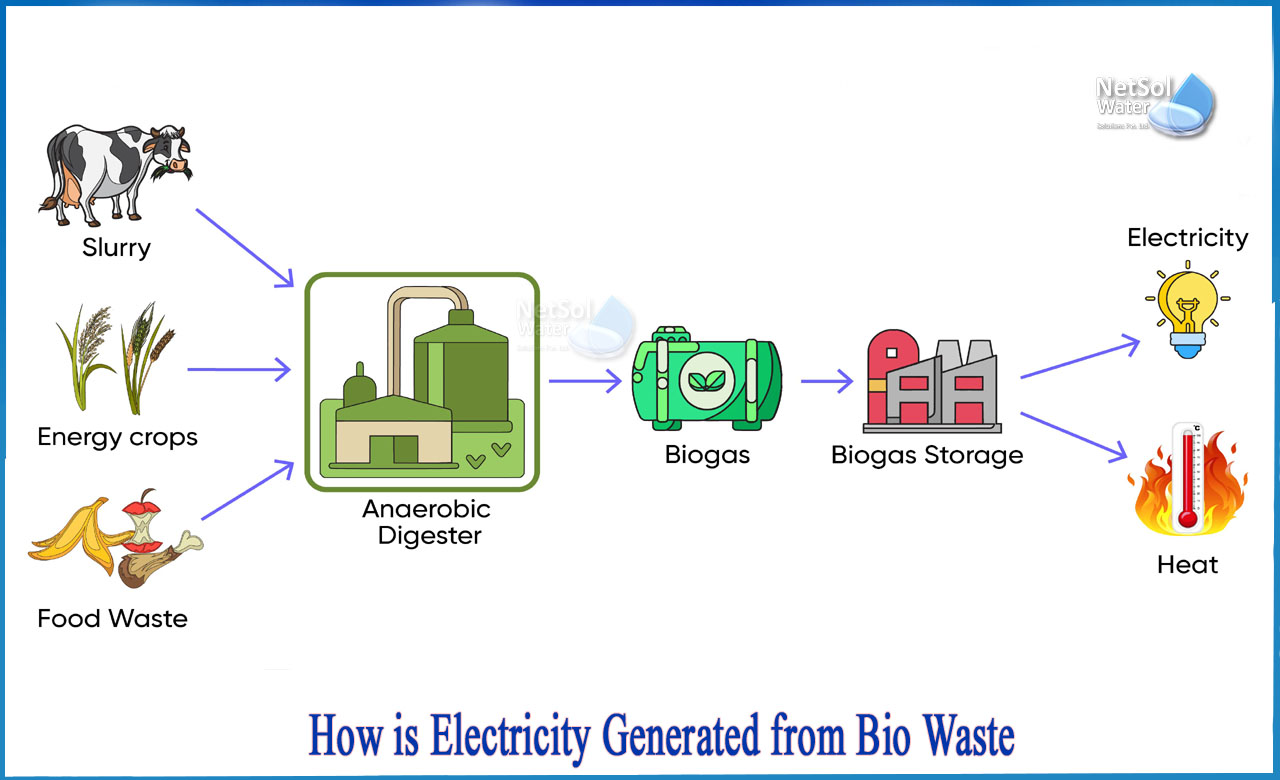Overview
Depending on the circumstances, biowaste can account for up to 50% of total household waste.
Many wastes of a similar nature are generated in restaurants and commercial chains, as well as in industry, as a result of the production of the products themselves.
What are we going to do with this stuff?
How is electricity generated from bio waste?
There are ways to process biodegradable waste in a controlled manner and even increase its value.
It refers to the biochemical processes of specific bacteria found in nature. Only a few hundred cubic meters are concentrated in a small volume during these processes.
>In concrete terms, the biowaste, which is primarily delivered from towns, cities, and parts of towns, will be crushed at first.
>The material is then sorted through several stations, with everything that cannot be composted being separated. Metals and plastic waste are two examples. This sorting is done mechanically at first, and then by trained employees in a second step.
>The shredded pure biowaste is then placed in so-called fermentation boxes, where it is fermented by bacteria. This biogas, which is approximately 55% methane and 45% carbon dioxide, is used as fuel for two combined heat and power plants, which generate electricity and heat from the biogas. The heat is used to power the fermentation plant, i.e. to generate more fuel. Electricity, on the other hand, is a genuine new and valuable product that is fed into the local grid.
What is feed stock?
When biomass is used to generate energy, it is referred to as 'feedstock.' Feedstocks can be grown specifically for their energy content (an energy crop), or they can be made from waste products from industries like agriculture, food processing, or timber production.In boilers or furnaces, dry, combustible feedstocks such as wood pellets are burned. This, in turn, boils water and produces steam, which drives a turbine to produce electricity.
Wet feedstocks, such as food waste, are placed in sealed tanks where they rot and produce methane gas (also called biogas). The captured gas can be burned to generate electricity. Alternatively, it can be fed into the national gas grid and used for cooking and heating.
Bioenergy is a highly adaptable energy source. It can be quickly turned up and down to meet demand, making it an excellent backup for weather-dependent renewable technologies like wind and solar.
The operation of waste-to-energy plants
Waste-to-energy plants use municipal solid waste (MSW), also known as garbage or trash, to generate steam in a boiler, which is then used to generate electricity.
MSW is a composite of energy-dense materials such as paper, plastics, yard waste, and wood products.
There are various waste-to-energy systems or technologies. The mass-burn system is the most common type used, in which unprocessed MSW is burned in a large incinerator equipped with a boiler and a generator to generate electricity.
In a mass-burn waste-to-energy plant, electricity is generated in seven stages:
· Garbage trucks dump waste into a large pit.
· A crane's massive claw grabs waste and deposits it in a combustion chamber.
· The waste (fuel) is burned, resulting in the release of heat.
· In a boiler, heat converts water to steam.
· To generate electricity, high-pressure steam turns the blades of a turbine generator.
· An air pollution control system filters pollutants from combustion gases before they are released through a smoke stack.
· The ash from the boiler and the air pollution control system is collected.
These technologies can help in saving energy sources and being more sustainable.
Netsol Water is Greater Noida-based leading water & wastewater treatment plant manufacturer. We are industry's most demanding company based on client review and work quality. We are known as best commercial RO plant manufacturers, industrial RO plant manufacturer, sewage treatment plant manufacturer, Water Softener Plant Manufacturers and effluent treatment plant manufacturers. Apart from this 24x7 customer support is our USP. Call on +91-9650608473, or write us at enquiry@netsolwater.com for any support, inquiry or product-purchase related query.



